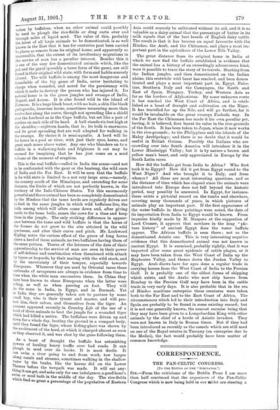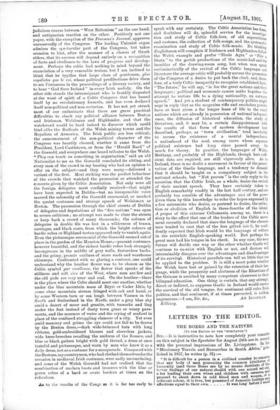CORRESPONDENCE.
THE PAN-CELTIC CONGRESS.
(To THE ED/TOR OF THE "SPECTATOR.")
Sin,—From the criticisms of the Dublin Press I am more than half convinced that the organisers of the Pan-Celtic Congress which is now being held in our midst are steering a
judicious course between " West Britonism " on the one hand, and antiquarian reaction on the other. Positively not one paper, with the exception of the Freeman's Journal, approves unreservedly of the Congress. The leading Unionist organ admires the syectacular part of the Congress, but takes occasion to hint, after the manner of a chorus of Greek elders, that its success will depend entirely on a recognition of facts and obedience to the laws of progress and develop- ment. Perhaps the critic had nothing in mind beyond the enunciation of a very venerable truism, but I am inclined to think that he typifies that large class of gentlemen, plus royalistes que le roi, whose political predilections drive them to see Fenianism in the proceedings of a literary society, and to hear " God Save Ireland " in every Irish melody. On the other side stands the intransigeant who is frankly disgusted at the want of spirit of a Celtic Congress that has bound itself by no revolutionary formula, and has even declared itself non-political and non-sectarian. A has not yet struck most of our enthusiasts that there are grave practical difficulties to check any political alliance between Breton and Irishman, Welshman and Highlander, and that the watchword would be hard indeed to discover which could bind alike the Radicals of the Welsh mining towns and the Royalists of Armorica. The Irish public are less critical; the announcement of the non-political character of the Congress was heartily cheered, whether it came from the President, Lord Castletown, or from the " Herald Bard" of the Gorsedd, and everywhere one heard tributes to the Welsh. "They can teach us something in organisation," said an old Nationalist to me as the Gorsedd concluded its sitting, and every man of the crowd in my hearing who had an opinion to offer on the subject—and they were many—delivered a variant of the first. Most striking was the perfect behaviour of the crowds that watched the procession or attended the concerts given by the Celtic Association. Not only were all the foreign delegates most cordially received—that might have been expected in Dublin—but no irresponiible voice marred the solemnity of the Gorsedd ceremonial, or mocked the quaint costumes and strange speech of Welshman or Breton. The procession through the chief streets of Dublin of delegates and deputations of the " five nations" was open to severe criticism ; no attempt was made to clear the streets or keep back a crowd of many thousands; the column of delegates in double file was lost in a wilderness of trams, carriages, and black coats, from which the bright colours of bardic robes or Highland tartan appeared only to vanish again. Even the picturesque ceremonial of the Gorsedd seemed out of place in the garden of the Mansion House,—peasant costumes, however beautiful, and the richest bardic robes look strangely incongruous in the middle of grey walls, featureless backs, and the grimy, prosaic outlines of store roofs and warehouse chimneys. Confronted with so glaring a contrast, one could understand why the heather flower was to be chosen as the Celtic symbol par excellence, the flower that speaks of the stillness and soft airs of the West, where men are few and the old gods are very near and real. On the heather—there is the place where the Celts should meet one another, whether under the blue mountain mass of Eryri or Corder Idris, by some clear mountain stream fringed with oak and hazel, or by some Western tarn or sea lough between Vannes in the South and Sutherland in the North, under a grey blue sky amid a desert of moor and granite, with tussocks and ling under the feet instead of dusty town grass or weary pave- ments, and the murmur of water and the crying of seafowl in place of the confused struggling clamour of a city. Yet even amid masonry and grime the eye could not fail to be drawn by the Breton dress,—dark wide-brimmed hats with long ribbons, gold-embroidered blouses and sleeveless jackets, wide knee-breeches recalling the uniform of the Zonave, and blue or black gaiters bright with gold thread, a dress at once tasteful and picturesque, and worn by men who knew it as a daily dress, not as a costume for a masquerade. Compared with the Bretons, my countrymen, who had clothed themselves for the occasion in mediaeval Irish costumes, were sadly unconvincing, and some of the Welsh Gorsedd had not realised that the combination of modern boots and trousers with the blue or green robes of a bard or ovate borders at times on the ridiculous.
As to the results of the Congr: ss it is far too early to
speak with any certainty. The Celtic Association has date, and doubtless will do, splendid service for the invest* tion and study of Celtic folk-lore, of old superstition; and customs, the collection of folk-songs, and the systematic examination and study of Celtic folk-music. No thinking Englishman will complain if Irishmen and Highlanders follow the Welsh example and prefer " Shule Agra " or "Phir a bhata " to the garish productions of the music-hall and the inanities of the drawing-room song, but when men speak enthusiastically of the revival of the Celtic languages and literature the average critic will probably accuse the promoters of the Congress of a desire to put back the clock, and, there. fore, of a truly Celtic incapacity to recognise established facto. " The future," he will say, " is for the great nations and tbe:r languages ; political and economic causes make hopeless the attempt to restore life to a dying nationality, an outworn speech." And yet a student of contemporary politics might urge in reply that as the magazine rifle and smokeless powder have at least given a far longer lease of life to the small nations which are already in possession of national indepesd. ence, the diffusion of historical education, the study of literature, and, it may be, a certain disappointment with the results of that form of modern development best described, perhaps, as " town civilisation," tend inevitably to secure the existence of a mental independence, a nationhood of the soul, among races whose separate political existence had long since passed away. So much for theory. In praCtice, the languages of Wales, Brittany, and probably of the Highlands, though here suffi• cient data are required, are still vigorously alive. As to Ireland, there is no doubt a movement in favour of the preser- vation of the Gaelic language, and a tendency to demand that it should be taught as a compulsory subject in the national schools, but " Not proven " is the only reply to the assertion that the Celtic Irish, as a whole, desire the revival of their ancient speech. They have certainly taken to English remarkably readily in the last half-century, and are probably too sensible of the advantages and of the power given them by this knowledge to echo the hopes expressed by a few extremists who desire, or pretend to desire, the extine. tion or abolition of English in three-fourths of the island. A propos of this extreme Celtomania among us, there is a story to the effect that one of the leaders of the Celtic move• ment recently declared that since the language of the cleverer race tended to oust that of the less gifted (sic ?), he confi. dently expected that Irish would be the language of culture in the erstwhile English-speaking world. But perhaps the great man had his tongue in his cheek. In any case, the near future will decide one way or the other whether Gaelic will continue to co-exist with English or not, and doctors will interminably disagree over the advantages and disadvantages of its survival. Historical parallels can tell us little that can be applied to the problem. It is still a moot point whether the Welsh have lost or gained by the retention of their Ian. guage, while the prosperity and alertness of the Rhaetians of the Grisons is ascribed by many competent observers to their bilingual education. One thing is certain, that any attempt, direct or indirect, to suppress Gaelic in Ireland would ensure the survival of the old tongue, for sentiment still rules Irish politics, and that sentiment, if at times perverted, is seldom



































 Previous page
Previous page